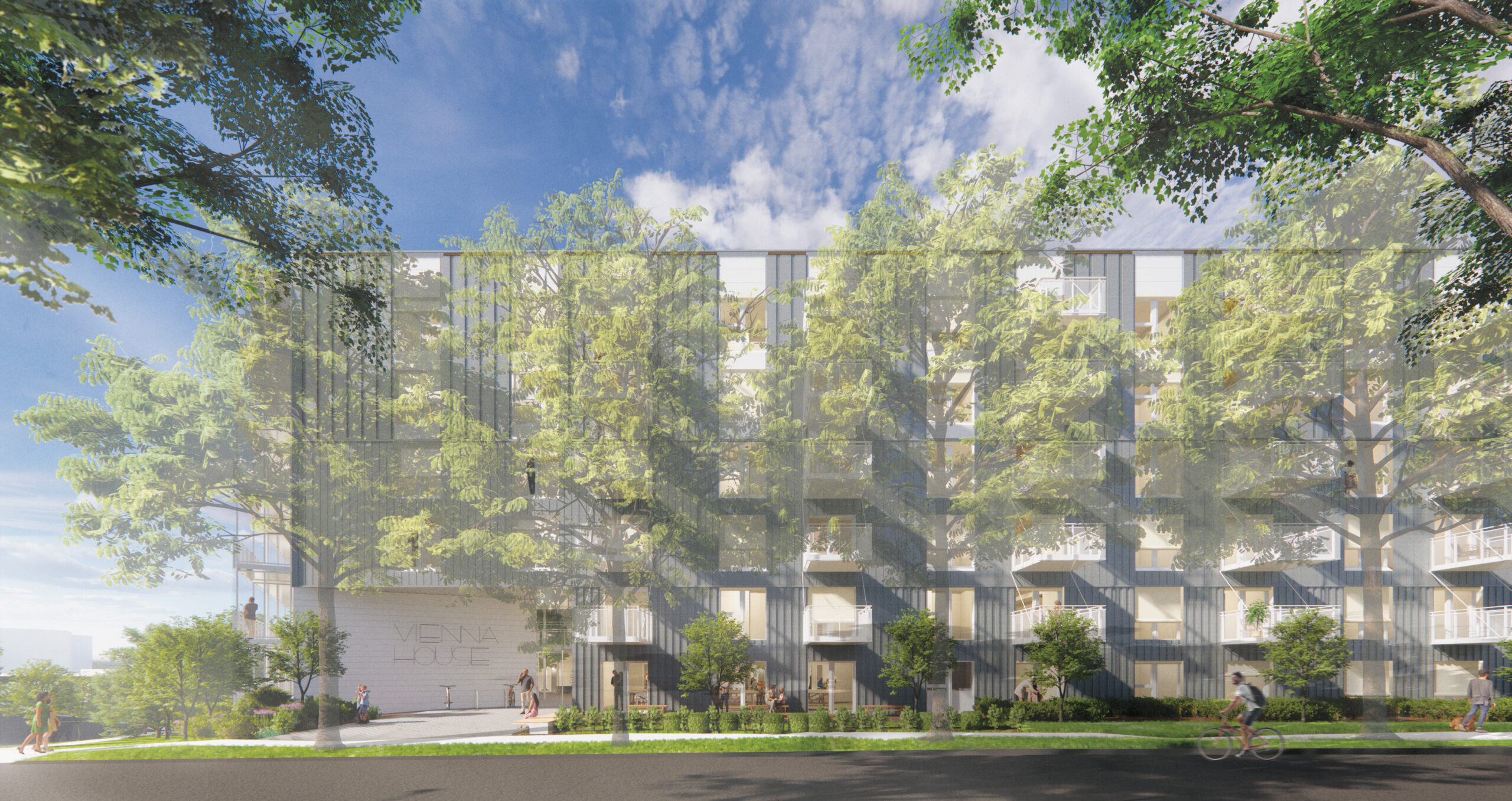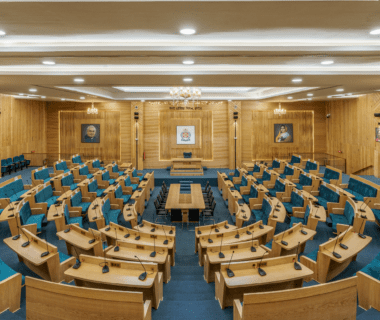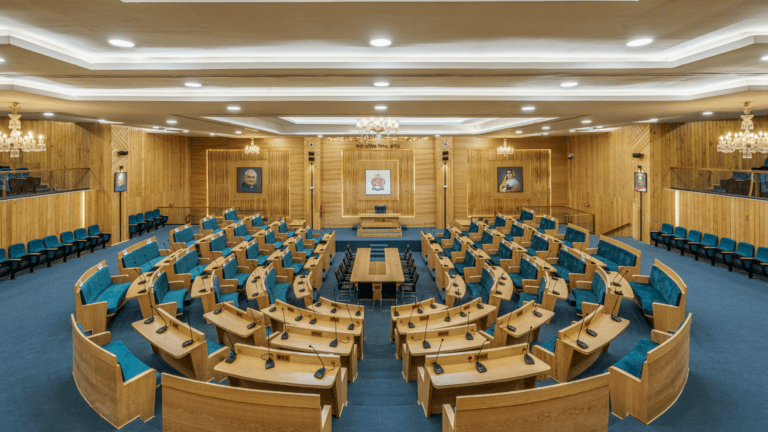By Travis Joern

Michael Loseth, CEO of FII, delivering opening remarks at the summit in Huzhou, Zhejiang province
A substantial outreach program focused on Low-Carbon Development in China was conducted by Forestry Innovation Investment’s China team (FII China), with support from Canada Wood China (CW China) and the Consulate General of Canada in Shanghai. Three summits were held in the provinces of Zhejiang on September 27-29, Jiangsu on October 13-15 and Hubei on November 16-18. These events were planned along a similar framework, with a bilateral summit that included senior officials, expert speakers, roundtable discussions and project site visits. These events allowed for high-level exchanges on themes relevant to government planning, policy innovation, technical research, and low carbon development case studies. The exchanges, in turn, fostered a discussion amongst senior government representatives on prospects for bilateral cooperation in areas such as carbon neutrality, advanced construction, and green development.

Carolyn Smyth, Research Scientist for Canadian Forest Services, Natural Resources Canada shared a comparative analysis of climate change mitigation options for B.C.
The central theme of these summits was the carbon neutrality targets announced by Canada to reach by 2050 and China to reach by 2060. FII CEO Michael Loseth emphasized that these goals call for collective efforts with building operations and the construction sector, which account for around 40 percent of global carbon emissions. The goal of reaching carbon neutrality will require significant economic and social changes and depends on shifts to operating protocols across every major industry. Chinese government leaders in each province reiterated the point that meeting carbon reduction goals can create opportunities for advancement in innovative clean technologies, and is also an important occasion for international collaborations to tackle climate change. In this context, carrying out international exchanges and best practices in the areas of sustainable development and climate change mitigation is quite significant.

Models of advanced wood projects were on display for senior officials before the opening of each session. In Jiangsu, the Consul General Dave Murphy followed a tour alongside the Deputy Secretary General of the Jiangsu Provincial Government, Wang Siyuan.
The Chief Forester for the B.C. Government, Diane Nicholls, gave a presentation that demonstrated how forests play an exceptional role in mitigating climate change, as the growth of trees serve as a carbon sink as they absorb carbon dioxide and release oxygen. Her presentation gave a detailed explanation of how Canada and the province of B.C. are seen as global leaders in sustainable forest management practices, advocating for the effective balance between the protection and utilization of forestry resources. Stringent regulations and reforestation, science-based practices and public consultation involving government, industry and First Nations are working to ensure B.C.’s forests remain healthy to sustain ecosystem and social values, as well as a long-term supply of wood fibre.
B.C. is committed to prolonging the application phase of its forestry resources so that the carbon cycle can be extended to mitigate climate change impacts. Further presentations by Nancy Xie, Director of Government Relations for FII China, and Travis Joern, Director of Corporate Communications for FII China, reinforced this message on the carbon benefits of using wood in construction, the sustainable management of Canadian forests, and examples of new technologies featured in Canadian wood projects. Wood products offer a carbon capture solution as they contain the absorbed carbon beyond the lifespan of the tree, otherwise carbon is released by trees that die and decompose in nature.

Diane Nicholls, Chief Forester for the B.C. Government, shared sustainable forestry practices
FII China engaged with the provincial Foreign Affairs Offices (FAO) to coordinate each of these events, and the FAO helped facilitate the participation of senior provincial officials along with the provincial levels of departments such as the Ministry of Housing and Urban Rural Development (MOHURD), the National Development and Reform Commission (NDRC), the National Forestry and Grasslands Administration (NFGA), as well as other provincial departments including the Department of Ecology and Environment and the Department of Natural Resources. While national regulations and planning for these departments are set at the central level in Beijing, it is at the provincial levels where they determine the local implementation of those policies, and how they can achieve measurable results. This makes the program particularly meaningful, as the information discussed will be closely reviewed to determine how it may fit into ongoing development planning for each region.
The bilateral nature of these events was reinforced by the Canadian Ambassador to China, Dominic Barton, and the Chargé d’affairs of the Chinese Embassy in Canada, Lan Heping, who sent recorded messages for the summit in Jiangsu, along with the Consul General of China in Vancouver, Tong Xiaoling, who sent a message for the summit in Hubei, and the Consul General of Canada in Shanghai, Dave Murphy, who attended all three events.

Municipal authorities in Zhejiang province joined together for roundtable discussions on the topic of Low-Carbon Development, exchanging best practices and identifying areas for collaboration
In addition to the provincial authorities that participated, each event also had municipal level officials attending for exchanges at the city level. In Zhejiang, there were representatives from the cities of Hangzhou, Huzhou, Lishui and Quzhou. In Jiangsu, the event included representatives from the cities of Nanjing, Changzhou, Suzhou and Wuxi. In Hubei, there were representatives from the cities of Yichang, Jingzhou, Jingmen and Enshi.

In Hubei province, FII China joined a partnership with the cities of Yichang, Jingzhou, Jingmen and Enshi for collaborations on low-carbon development in the field of construction
Building on the municipal level exchanges, in both Zhejiang and Hubei, panel discussions were held for the city representatives, with new commitments made to enhance collaborations on low-carbon development strategies. From B.C., Patrick Enright, a Senior Green Building Engineer for the City of Vancouver, gave a presentation on best practices for the sustainable development of global liveable cities, outlining Vancouver’s six-stage plan for carbon reduction.

Patrick Enright, Senior Green Building Engineer for the City of Vancouver, introduces the Climate Emergency Action Plan (CEAP) for Vancouver
These events also fostered industry collaborations, with relevant industry associations, institutions, academies, designers and developers attending. In Jiangsu, the International Green Building Alliance (IGBA) partnered with CW China for a joint declaration to promote the advantages of wood construction as a solution for Jiangsu’s green and low-carbon development. This declaration was signed by 26 supporting organizations and companies active in Jiangsu to promote innovative practices on wood-frame construction (WFC), to jointly explore solutions for WFC in Jiangsu, and to strengthen exchanges and cooperation on technical research for wood construction among institutions, universities and enterprises.

A new platform was launched to promote WFC in Jiangsu, with Canada Wood and 26 supporting partners
To create a more lasting impression with participants, in addition to the forums, the program also included site visits in each region, allowing the audience to see projects and companies that are contributing to carbon reduction efforts. In Zhejiang, the program visited the Huzhou Urban Planning Exhibition Hall, the Green Building Construction Base of the Dadongwu group, the New Decoration Material Company of Dehua Tubaobao in Deqing County, and wood projects in the Moganshan tourism area of Deqing. In Jiangsu, attendees were brought to the prefabrication wood factory of Suzhou Crownhomes and the Xuhong Bridge, which was the largest truss arch wood bridge in the world when it was completed in 2011. For Hubei, the site visits included visits to Wanhao Ecological Boards, the recycling company GEM China, the Zhanghe Ecological River and rural revitalization projects in Jingmen.
These events received tremendous support from the Consulate General of Canada in Shanghai, with Consul General Dave Murphy and his team of trade commissioners joining all three events, along with the Canadian Trade Office representatives in Nanjing, Hangzhou and Wuhan attending in their respective provincial events. The events would not have been possible without the close support of the Jiangsu FAO, the Zhejiang FAO and the Hubei FAO, who worked closely with FII for the planning and delivery of these events.



